Pete Sutton's Blog, page 30
September 21, 2015
Guest post by Morgan Bell
Kickstarting An AnthologyBy Morgan Bell
Sproutlings Kickstarter
A seed of an idea
Have you ever thought about editing an anthology?
I love editing. And I love the joy that community publishing projects bring to emerging writers. For many people an anthology is a first chance to get published. It can also be a new chance for an author to get noticed, to rustle their leaves a bit in the virtual forest of indie books
An anthology, because of the mass of contributors, is a marvel of collaborative energy. The production value is higher. The distribution is wider. And the good will is stronger. Every author in the collection comes with its own team of supporters: friends, family, and fans. An anthology is the perfect project to crowdfund.
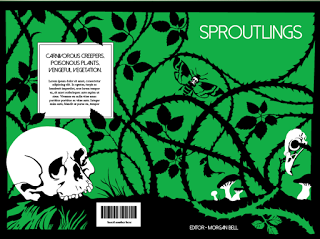
Putting down roots
Which crowdfunding platform is best for anthologies?
I chose Kickstarter, and I’ll tell you why.
The anthology I am editing, Sproutlings: A Compendium of Little Fictions, is a Hunter Anthologies project. Hunter Anthologies is based in Newcastle Australia. Last year the editor of Novascapes: A Speculative Fiction Anthology, Cassandra Page, ran a crowdfunding campaign through Pozible. In the final two days the campaign was only about 17% funded. I strapped myself to my laptop and hammered Twitter and Facebook to create a bit of momentum. The project met the $3k target in the last minute. That was cutting it too close.
Two recent news stories about crowdfunding stuck in my mind:
1. Those bigot pizza shop owners, Memories Pizza in Indiana USA, refusing to cater hypothetical gay wedding pizza parties, going out of business due to their stance, and having $842k donated by conservative sympathisers on GoFundMe
2. The dude, Zach Danger Brown, who raised $55k to make a potato salad on KickstarterIt’s horses for courses.
GoFundMe specialities in charity causes. Kickstarter specialises in creative projects. Kickstarter is also rated highest out of the plethora of up and coming crowdfunding platforms for driving internal traffic ie Kickstarter is a community in itself. People with Kickstarter accounts go there to browse for projects with cool or limited edition rewards. That’s why there are strict guidelines that donation-only (no reward, no product) benevolent causes are not permitted on the Kickstarter. You have to make something. Kickstarter has established itself as marketplace for creative people.
From little things big things grow
Why Kickstarter over Pozible?
I know how I like to market, and it is community based. So lots of small pledges. A virtual shaking of a tin. Many people want to help but they don’t have $50 to pledge, they may not even have $10. Some fee-pricing models make relying on micro-donations unviable. Kickstarter has a discounted payment processing fee for micro-pledges.
Creative people like to support other creative people. So when you are relying on starving artists it is best to accommodate for them. I included tangible rewards (ie something greater than my gratitude or a warm feeling) for pledges of $2, $5, and $8 to encourage and appreciate the low rollers. I’ve been a low roller, and it test your generosity when the bidding starts too high.
The organic feel
Sproutlings: A Compendium of Little Fictions is about as grass roots as it gets in publishing. It is not being marketed on author notoriety, a list of author names has not yet been publicly released. The authors have a secret group where identities were revealed, but it true egalitarian style we don’t want any tall poppies sprouting before the book launch.
To paraphrase Amanda Palmer in The Art of Asking, the best way to engage the curiosity and good nature of people is to ask them for help. Sproutlings is running two Thunderclap crowdspeaking campaigns that will blast off in the final days of the Kickstarter. Thunderclap is a free and easy to use service that allows you to harness the social media power of the crowd. People sign up to distribute one scheduled Tweet (they can also use Facebook or Tumblr), it takes 100 people to activate the campaign. Asking people individually to help you with the Thunderclaps raises awareness about the Kickstarter. Many people click through and pledge.
Movement and sound
We live in a multi-media world.
I’m addicted to YouTube. You’re addicted to YouTube. We like to have our senses engaged.According to Kickstarter “projects with videos succeed at a much higher rate than those without (50% vs. 30%)” and they’re “by far the best way to get a feel for the emotions, motivations, and character of a project”.
One of the contributing authors to Sproutlings: A Compendium of Little Fictions is a mad keen video book trailer creator, running Moosey Productions. Sproutlings had two promotional videos made. I selected some free creative commons instrumental music myself, one is a spindly creepy gothic tune, the other is a curious xylophone tango climbing the walls.
My authors love to share the videos on social media because they are fun. You know your friends will like them, and possibly ask questions.
I have seen the results on my Kickstarter dashboard stats, people are clicking through from the YouTube videos.
All the things
Make your message easy for people to share.
Mock up some promotional images to share on Facebook and Twitter using Powerpoint and saving the slide as a JPG. Put a great description in words, and all your links, in the description of the image. When people share the image all the info comes along for the ride, nothing high tech, not even cut and paste.
Use the description box and annotations on your video/s.
Post regular project updates to the backers on your Kickstarter.
Use Tweet Deck to schedule round the clock messaging to allow people in other time-zones to find out about the project.
Start a Facebook Fan Page for your anthology, and create an online launch Event on Facebook, and invite, invite, invite.
Answer people when they have questions, listen to feedback, consult your author team, and thank people for sharing!
Join the Thunderclap, Like the Facebook page, Support the Kickstarter:
https://www.thunderclap.it/projects/30874-sproutlings-fiction-48-hourshttps://www.thunderclap.it/projects/30872-sproutlings-anthologyhttps://www.facebook.com/SproutlingsAnthology
https://www.facebook.com/events/458448997675087/
Sproutlings Kickstarter
A seed of an idea
Have you ever thought about editing an anthology?
I love editing. And I love the joy that community publishing projects bring to emerging writers. For many people an anthology is a first chance to get published. It can also be a new chance for an author to get noticed, to rustle their leaves a bit in the virtual forest of indie books
An anthology, because of the mass of contributors, is a marvel of collaborative energy. The production value is higher. The distribution is wider. And the good will is stronger. Every author in the collection comes with its own team of supporters: friends, family, and fans. An anthology is the perfect project to crowdfund.

Putting down roots
Which crowdfunding platform is best for anthologies?
I chose Kickstarter, and I’ll tell you why.
The anthology I am editing, Sproutlings: A Compendium of Little Fictions, is a Hunter Anthologies project. Hunter Anthologies is based in Newcastle Australia. Last year the editor of Novascapes: A Speculative Fiction Anthology, Cassandra Page, ran a crowdfunding campaign through Pozible. In the final two days the campaign was only about 17% funded. I strapped myself to my laptop and hammered Twitter and Facebook to create a bit of momentum. The project met the $3k target in the last minute. That was cutting it too close.
Two recent news stories about crowdfunding stuck in my mind:
1. Those bigot pizza shop owners, Memories Pizza in Indiana USA, refusing to cater hypothetical gay wedding pizza parties, going out of business due to their stance, and having $842k donated by conservative sympathisers on GoFundMe
2. The dude, Zach Danger Brown, who raised $55k to make a potato salad on KickstarterIt’s horses for courses.
GoFundMe specialities in charity causes. Kickstarter specialises in creative projects. Kickstarter is also rated highest out of the plethora of up and coming crowdfunding platforms for driving internal traffic ie Kickstarter is a community in itself. People with Kickstarter accounts go there to browse for projects with cool or limited edition rewards. That’s why there are strict guidelines that donation-only (no reward, no product) benevolent causes are not permitted on the Kickstarter. You have to make something. Kickstarter has established itself as marketplace for creative people.
From little things big things grow
Why Kickstarter over Pozible?
I know how I like to market, and it is community based. So lots of small pledges. A virtual shaking of a tin. Many people want to help but they don’t have $50 to pledge, they may not even have $10. Some fee-pricing models make relying on micro-donations unviable. Kickstarter has a discounted payment processing fee for micro-pledges.
Creative people like to support other creative people. So when you are relying on starving artists it is best to accommodate for them. I included tangible rewards (ie something greater than my gratitude or a warm feeling) for pledges of $2, $5, and $8 to encourage and appreciate the low rollers. I’ve been a low roller, and it test your generosity when the bidding starts too high.
The organic feel
Sproutlings: A Compendium of Little Fictions is about as grass roots as it gets in publishing. It is not being marketed on author notoriety, a list of author names has not yet been publicly released. The authors have a secret group where identities were revealed, but it true egalitarian style we don’t want any tall poppies sprouting before the book launch.
To paraphrase Amanda Palmer in The Art of Asking, the best way to engage the curiosity and good nature of people is to ask them for help. Sproutlings is running two Thunderclap crowdspeaking campaigns that will blast off in the final days of the Kickstarter. Thunderclap is a free and easy to use service that allows you to harness the social media power of the crowd. People sign up to distribute one scheduled Tweet (they can also use Facebook or Tumblr), it takes 100 people to activate the campaign. Asking people individually to help you with the Thunderclaps raises awareness about the Kickstarter. Many people click through and pledge.
Movement and sound
We live in a multi-media world.
I’m addicted to YouTube. You’re addicted to YouTube. We like to have our senses engaged.According to Kickstarter “projects with videos succeed at a much higher rate than those without (50% vs. 30%)” and they’re “by far the best way to get a feel for the emotions, motivations, and character of a project”.
One of the contributing authors to Sproutlings: A Compendium of Little Fictions is a mad keen video book trailer creator, running Moosey Productions. Sproutlings had two promotional videos made. I selected some free creative commons instrumental music myself, one is a spindly creepy gothic tune, the other is a curious xylophone tango climbing the walls.
My authors love to share the videos on social media because they are fun. You know your friends will like them, and possibly ask questions.
I have seen the results on my Kickstarter dashboard stats, people are clicking through from the YouTube videos.
All the things
Make your message easy for people to share.
Mock up some promotional images to share on Facebook and Twitter using Powerpoint and saving the slide as a JPG. Put a great description in words, and all your links, in the description of the image. When people share the image all the info comes along for the ride, nothing high tech, not even cut and paste.
Use the description box and annotations on your video/s.
Post regular project updates to the backers on your Kickstarter.
Use Tweet Deck to schedule round the clock messaging to allow people in other time-zones to find out about the project.
Start a Facebook Fan Page for your anthology, and create an online launch Event on Facebook, and invite, invite, invite.
Answer people when they have questions, listen to feedback, consult your author team, and thank people for sharing!
Join the Thunderclap, Like the Facebook page, Support the Kickstarter:
https://www.thunderclap.it/projects/30874-sproutlings-fiction-48-hourshttps://www.thunderclap.it/projects/30872-sproutlings-anthologyhttps://www.facebook.com/SproutlingsAnthology
https://www.facebook.com/events/458448997675087/
Published on September 21, 2015 04:48
September 17, 2015
Guest post by Bryan Koepke
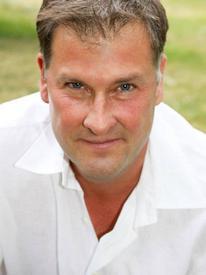
Bryan Koepke is the author of Vengeance

He's dropped in to talk about writing thrillers
To Me Writing a Thriller Novel is like Painting a Canvas with Oils
When I was a teenager I’d sometimes watch a television show titled - The Joy of Painting. The show’s host, Bob Ross, would start with a blank white canvas, a wooden palette stained in a rainbow of colors, and a tray of paintbrushes. As he talked to the television audience he’d apply layer after layer to his easel. Soon fluffy white clouds would take shape in a bright blue sunlit sky. Then he’d apply a streak of brown moving upward, change to a different brush, dab at some paint, and after adding a few dabs of green there’d be a tree. He’d repeat this process several times all the while talking to his audience and in his mind dreaming up what he’d paint. Slowly out of the white canvas a forest of trees would come into existence. Next the artist would paint a small cabin, a lake, some ducks, and finally a majestic mountain range would all take their place on his ever-changing work of art. For me the craft of writing a thriller novel is similar. I start with a central story idea. Then I add my hero Reece Culver, and his sidekick Haisley Averton – all the while drawing from the character sketches I’ve built for both of them. I write fast and furiously, and each night I think about the story I’m creating. Sometimes I’ll eve dream about a particular scene or chapter. Then I add more characters, another subplot, and another dimension of the story. Layer by layer I build my novel – each time adding depth, tension, and a dash of mystery. Occasionally I’ll awake from my slumber and while I blink my eyes welcoming the new day my thoughts will travel to a completely new layer I’ve dreamt up the night before. With a fresh cup of coffee on my desk my fingers will touch the keys of the keyboard and transform these thoughts to paragraphs in the story. Along the way I’ll use the tools I’ve learned in my craft outlining the scenes and chapters, and referencing the timeline to ensure that every sentence fits the flow of events. Next point of view will be examined to ensure it’s consistent and doesn’t jump between characters within a single scene. When that initial draft is complete I’ll come back through the story with my big editing paintbrush smoothing out sentences and paragraphs, choosing words, and all the while keeping my original story idea at the top of my thoughts. With each new rewrite I’ll use smaller edits, and less and less will change until I’m satisfied that it will serve one single purpose – to entertain the reader. If a person were there with me in my writing office watching, reading, and seeing this thriller take shape layer by layer they’d observe first hand how the writing of this genre is so much like the work of an artist painting his canvas step by step in multicolored oil paints. This time around I’ve added layer by layer to create what will be called SABOTAGE – Book 2 in the Reece Culver Thriller series. In this book while vacationing in the Scottish Highlands Reece Culver and his buddy Haisley Averton are pulled into the ever – changing world of Draecon International – a bubbling caldron of infidelity, corporate espionage, assassination, and a plot to destroy London’s Financial District.
Published on September 17, 2015 08:26
September 10, 2015
Guest Post - Anne Perry - Unmasking the Editor
We at Bristol Book Blog are interested in the whole publishing process so we thought we'd invite a top class editor to tell us about the role of the editor.
Anne Perry is a commissioning editor at Hodder & Stoughton. She spends her spare time thinking about monster movies.
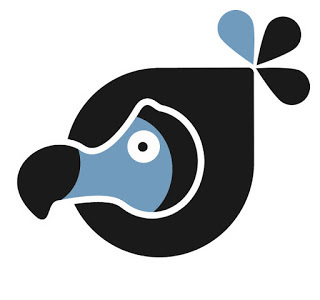
Unmasking the Editor
The best known job in publishing is also the one most shrouded in mystery. Why might an author need an editor, really? What does the editor at the publishing house that buys the book actually bring to the table? What does an editor really do?
First and foremost, the editor is the book’s biggest advocate at the publishing house. Reading a really exciting manuscript for the first time is a bit like falling in love, and it’s a pleasure and a privilege to be involved in the publishing of a book from the very start. So the editor falls in love with a manuscript: great! But the fun’s only just starting. It’s then her job to get everyone else at her company as excited about it as she is: she runs around the floor of her publishing house telling people how fantastic the manuscript and getting second reads to support her when she takes the manuscript to acquisitions. The editor pitches the book to the company, to bookstores and booksellers and to readers. I, for example, include personal letters with proofs that I send out to booksellers, reviewers and bloggers. The editor will spend the months and sometimes even years in the run-up to publication managing the project of publishing the book as well as possible.
Which brings me to my next point: editors are project managers. We work with a team in marketing, sales and publicity from the very beginning of the acquisitions process on developing a coherent vision for the book and how we’ll publish it. We strategize with our colleagues about everything from positioning and copy to covers and proofs. We all work together to find the best way to talk about the book: every title has an elevator pitch that we use to convey as much information about it as efficiently as possible whenever we need to. (And the need will inevitably arise at strange, unexpected moments!)
All the departments work together to ensure that the book’s package works – that the cover is a good fit for the content so that, for example, readers won’t buy a book expecting an historical romance and discover they’re reading contemporary non-fiction. Sometimes we get to create extra material to go with the book, like point-of-sale items to give to bookstores to hand out with the book, or to leave by the till for customers to pick up. We can work with bookstores to create window displays to help advertise the book; we create images and videos that are easily sharable on social media, we record podcasts and write blog posts and put the book forward for promotions. It’s all very much a team effort, and the editor is there to help steer the team and keep everything on track.
No one knows a book better than the acquiring editor; it’s her vision that steers these efforts from the beginning. Editors have specialties (I’m an SFF editor, for example) because, while it’s nearly impossible to have real insight into the entirebookbuying market, it is possible to have a pretty good understanding of particular segments of it. As an SFF editor I’m expected to be conversant in the classics of my field, to keep up with current publications by other SFF publishers, and generally to understand the modern UK readers of science fiction and fantasy: what they want, what they like, and what they’re likely to buy. I visit bookstores to see how booksellers are positioning SFF, attend signings and conventions, meet bloggers and reviewers and booksellers, and basically keep my nose to the ground. All of this helps my team work up exactly the right package for each of our books.
This knowledge of the market is equally important when it comes to working with the author. We find ourselves in kind of a peculiar position in commercial publishing – we’re taking art, the effort and devotion of a single person to create something wholly new, and commodifying it for mass consumption. We have to do this in such a way that we realize a nice profit on the book, but that the author doesn’t feel that her work is being cheapened and that her vision is being realised. So, in addition to structural edits and line edits, we editors also work with our authors in coming up with ideas for the next project and for her career years down the line, and for positing the author herself as a brand.
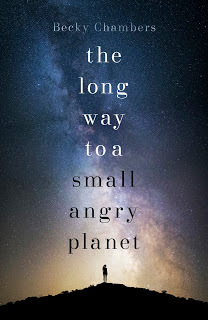
And what about the actual editing part of being an editor? That’s still the beating heart of an editor’s job. That’s where we apply all that knowledge of our genre to ensure that the book itself ultimately reads the right way. A good editor has a clear eye and suggests edits that are good for the book, regardless of the author’s ego (though a better editor will suggest these changes gently). Editing is, at the end of the day, the most difficult and the most rewarding part of the entire process. And if the editor feels that way, imagine how the author must feel!
As an editor, I spend all day engaged with publishing on every level, from the most basic (reading manuscripts) to the most abstract (designing long-term publishing strategies). It can be granular, time-consuming, painstaking and yes, occasionally, very boring. But it’s also the best and most rewarding job I could ever imagine. Like I said at the beginning: reading an exciting manuscript for the first time is like falling in love. And I get to fall in love over and over again.
Anne Perry is a commissioning editor at Hodder & Stoughton. She spends her spare time thinking about monster movies.

Unmasking the Editor
The best known job in publishing is also the one most shrouded in mystery. Why might an author need an editor, really? What does the editor at the publishing house that buys the book actually bring to the table? What does an editor really do?
First and foremost, the editor is the book’s biggest advocate at the publishing house. Reading a really exciting manuscript for the first time is a bit like falling in love, and it’s a pleasure and a privilege to be involved in the publishing of a book from the very start. So the editor falls in love with a manuscript: great! But the fun’s only just starting. It’s then her job to get everyone else at her company as excited about it as she is: she runs around the floor of her publishing house telling people how fantastic the manuscript and getting second reads to support her when she takes the manuscript to acquisitions. The editor pitches the book to the company, to bookstores and booksellers and to readers. I, for example, include personal letters with proofs that I send out to booksellers, reviewers and bloggers. The editor will spend the months and sometimes even years in the run-up to publication managing the project of publishing the book as well as possible.
Which brings me to my next point: editors are project managers. We work with a team in marketing, sales and publicity from the very beginning of the acquisitions process on developing a coherent vision for the book and how we’ll publish it. We strategize with our colleagues about everything from positioning and copy to covers and proofs. We all work together to find the best way to talk about the book: every title has an elevator pitch that we use to convey as much information about it as efficiently as possible whenever we need to. (And the need will inevitably arise at strange, unexpected moments!)
All the departments work together to ensure that the book’s package works – that the cover is a good fit for the content so that, for example, readers won’t buy a book expecting an historical romance and discover they’re reading contemporary non-fiction. Sometimes we get to create extra material to go with the book, like point-of-sale items to give to bookstores to hand out with the book, or to leave by the till for customers to pick up. We can work with bookstores to create window displays to help advertise the book; we create images and videos that are easily sharable on social media, we record podcasts and write blog posts and put the book forward for promotions. It’s all very much a team effort, and the editor is there to help steer the team and keep everything on track.
No one knows a book better than the acquiring editor; it’s her vision that steers these efforts from the beginning. Editors have specialties (I’m an SFF editor, for example) because, while it’s nearly impossible to have real insight into the entirebookbuying market, it is possible to have a pretty good understanding of particular segments of it. As an SFF editor I’m expected to be conversant in the classics of my field, to keep up with current publications by other SFF publishers, and generally to understand the modern UK readers of science fiction and fantasy: what they want, what they like, and what they’re likely to buy. I visit bookstores to see how booksellers are positioning SFF, attend signings and conventions, meet bloggers and reviewers and booksellers, and basically keep my nose to the ground. All of this helps my team work up exactly the right package for each of our books.
This knowledge of the market is equally important when it comes to working with the author. We find ourselves in kind of a peculiar position in commercial publishing – we’re taking art, the effort and devotion of a single person to create something wholly new, and commodifying it for mass consumption. We have to do this in such a way that we realize a nice profit on the book, but that the author doesn’t feel that her work is being cheapened and that her vision is being realised. So, in addition to structural edits and line edits, we editors also work with our authors in coming up with ideas for the next project and for her career years down the line, and for positing the author herself as a brand.

And what about the actual editing part of being an editor? That’s still the beating heart of an editor’s job. That’s where we apply all that knowledge of our genre to ensure that the book itself ultimately reads the right way. A good editor has a clear eye and suggests edits that are good for the book, regardless of the author’s ego (though a better editor will suggest these changes gently). Editing is, at the end of the day, the most difficult and the most rewarding part of the entire process. And if the editor feels that way, imagine how the author must feel!
As an editor, I spend all day engaged with publishing on every level, from the most basic (reading manuscripts) to the most abstract (designing long-term publishing strategies). It can be granular, time-consuming, painstaking and yes, occasionally, very boring. But it’s also the best and most rewarding job I could ever imagine. Like I said at the beginning: reading an exciting manuscript for the first time is like falling in love. And I get to fall in love over and over again.
Published on September 10, 2015 00:53
September 2, 2015
Signing up for Share and Scare
Published on September 02, 2015 07:10
August 25, 2015
Interview with Karin Tidbeck
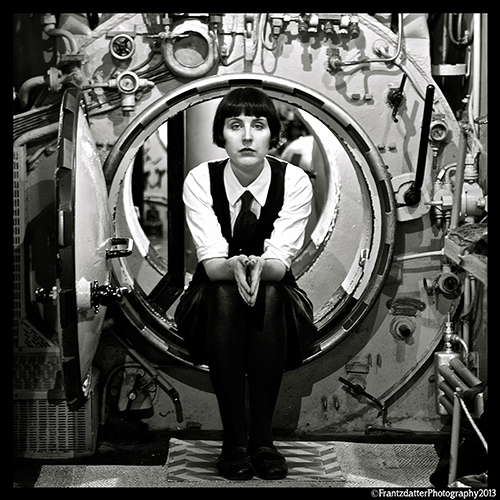
Karin Tidbeck is the award-winning author of Jagannath: Stories and the novel Amatka. She lives and works in Malmö, Sweden, where she makes a living as a freelance writer. She writes in Swedish and English, and has published work in Weird Tales, Tor.com, Words Without Borders anthologies like Fearsome Magics and The Time-Traveler's Almanac.
For anyone who is still unfamiliar with your work (living under a rock obviously) how would you describe it? Where’s the best place to find it?
Well, as Johanna Sinisalo and I established at Archipelacon this summer, I probably write Nordic Weird ... most of the time. I like to play around with reality. The best place to go is probably the bibliography on my website, where you can find links to all my published fiction and where to buy or read it.
We, being English, are most familiar with your short stories – can you tell us a bit about Amatka – is there any translation planned?
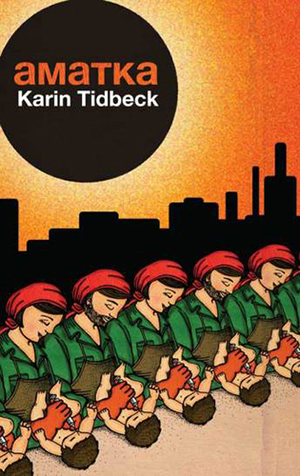
Amatka is a novel about the power of language over reality. A group of people have colonized another world, where matter reacts to language. I wanted to explore how conditions like those would shape a society, modes of thought, and what would happen if one upsets the order of things. There is a translation, and it's resting with my agent at the moment.
You are a keen LARPer how do you think that influences your writing? (We're so jealous of the LARP scene in Scandinavia!)
Nordic LARP is an excellent way to practice improvisation and reaching beyond your normal limits - I consider it brain cardio. I went to a Jungian LARP staged in a black box theatre last weekend; it was both amazing fodder for the imagination and gave me a sort of creative slingshot effect. I usually get a huge creative boost after LARPs like that. Writing for and organizing LARP also gives you a deeper insight into both worldbuilding and character creation; I've worked a lot with developing characters for various games, both avant-garde and commercial, and I think it's made my fiction more character-driven that it might otherwise be.
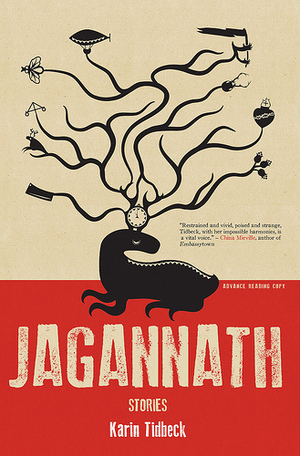
You are working on a new novel, can you share any details to whet our appetites?
It's set in the same world as the stories "Augusta Prima" and "Aunts", but that's about all I'm willing to share at the moment (although there's another tidbit below).
You’ve published on “Where Ghostwords Dwell” what’s the idea behind that?
The idea is to showcase notes, drafts and other things that ended up on the cutting room floor during the creation of a story. It's something readers don't usually get to see, and gives you a great insight into the creative process.
One of your short stories – the marvellous Who is Arvid Pekon - has been adapted to film. How involved in that process were you? What does it feel like to see your story come to life on screen?
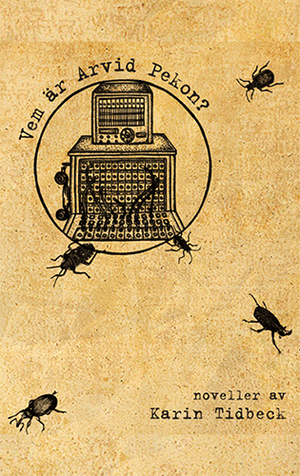
The director is a good friend of mine; we agreed that I would be very hands-off during the process except for answering questions here and there. I wanted him to have free rein. It turned out to be a very good thing, as the film is absolutely brilliant.
If you could be a character from any of your works who would it be and why?
I don't think I want to -be- any of the characters in my work. Most of them don't fare very well, do they. Well, maybe one. There's a librarian in my upcoming novel that I'm quite fond of, and who doesn't die horribly.
What’s currently on your “To Read” pile? Who do you think we should all be reading but aren’t?
On my pile right now is China Miéville's new short story collection, Annie Dillard's Pilgrim at Tinker Creek and Karin Johannisson's Melankoliska rum (Melancholy rooms). A writer you should have a look at is Zen Cho, who is also the guest of honor at next Åcon. Her upcoming novel, Sorcerer to the Crown, looks very very promising.
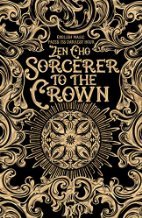
What’s the last thing you wrote and what did you learn about writing whilst writing it?
The last thing I finished was the second draft of the new novel, during which I learned to write dialogue in iambic pentameter. That was hard.
In one sentence what’s your best piece of advice for new writers?
Don't get stuck trying to write the perfect first sentence; finish the story and fix it later, for all first drafts are crap.
Published on August 25, 2015 02:13
Come and join the Bristol Festival of Literature online Flash Mob
Bristol Festival of Literature this year is Oct 15th-25th
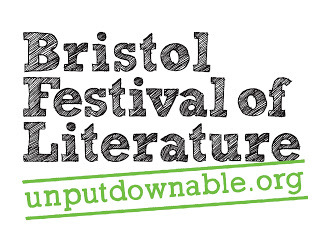
The Festival is unfunded and needs your support - spread the lit-love and get yourself some interesting 'rewards' including discounted tickets (inc for Novel Nights), T-shirts, twitter advice sessions and more. Tangent Books and Silverwood are sponsoring
You can also support the festival by sharing the message about the festival crowdfund appeal. We're using an online platform called Thunderclapit. which allows people to pledge a tweet or facebook message on the same time and on the same day for maximum effect to create an online flash mob. The only catch is we need 90 more people to make it work.
Join the flash mob: .Click here and choose: support with twitter or support with facebook to create an online flash mob (before Thursday)

The Festival is unfunded and needs your support - spread the lit-love and get yourself some interesting 'rewards' including discounted tickets (inc for Novel Nights), T-shirts, twitter advice sessions and more. Tangent Books and Silverwood are sponsoring
You can also support the festival by sharing the message about the festival crowdfund appeal. We're using an online platform called Thunderclapit. which allows people to pledge a tweet or facebook message on the same time and on the same day for maximum effect to create an online flash mob. The only catch is we need 90 more people to make it work.
Join the flash mob: .Click here and choose: support with twitter or support with facebook to create an online flash mob (before Thursday)
Published on August 25, 2015 01:54
August 18, 2015
Horrorcon competition
Only Two weeks left to get your entries in to the Bristol HorrorCon writing competition:
https://farhorizonsmagazine.wordpress...
In association with Bristol Festival of Literature, Bristol Horrorcon, Bristol Book Blog and Far Horizons magazine are launching a Horror Writing Competition. Closing to entries on 5th September.Do you think you can scare us? Then get scribbling. We are looking for the best Horror short stories. We want shivers down our spines, we want to be disturbed, we want you to confront us with your, and our, worst nightmares.Your story must be set in Bristol UK, it must be 4,000 words or less and it must be Horror. Apart from that go wild.Stories should be sent to BRSBKBLOG (at) gmail.com with the subject line – “I think this will scare you: story title: your name”. Stories will be judged anonymously by the editorial team at Far Horizons so please don’t put your name in the file. Please send as .doc, .docx or .rtf in a readable font, 12 point, in English with UK spelling. Far Horizons is set up to help beginning writers improve and if your story doesn’t make it to the shortlist, and you’d like feedback as to why, and some constructive criticism then please contact us after the winners are announced.The top three stories will be published in Far Horizons November Issue and also win fabulous prizes kindly donated by PS Publishing (lots of book goodies from their catalogue) and Forbidden PlanetWinners will be announced at Horrorcon on the 17th October.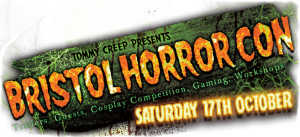 Bristol Horror Con will take place on Saturday 17th October 2015 at the Future Inn, Bristol. The expo will celebrate horror in literature, film, music, games and art. The day celebrates horror across all mediums and will feature guests, traders, games, cosplay competition, a film screening, sfx demo and more!Follow the Facebook page and Facebook Event for updates on tickets and guests.
Bristol Horror Con will take place on Saturday 17th October 2015 at the Future Inn, Bristol. The expo will celebrate horror in literature, film, music, games and art. The day celebrates horror across all mediums and will feature guests, traders, games, cosplay competition, a film screening, sfx demo and more!Follow the Facebook page and Facebook Event for updates on tickets and guests.
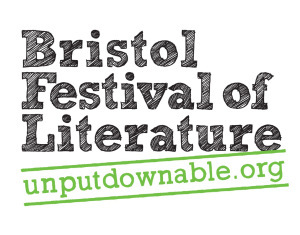 Bristol Festival of Literature is a programme of events and performances celebrating fiction (novels, short stories and flash fiction) with some poetry and Bristol-based non-fiction. We do this in three ways: We inspire audiences by inviting the very best UK and International authors to perform here; we engage communities with each other through creative-word events for interest groups and neighbourhoods; and we equip writers at all levels from beginner to professional with masterclasses, showcase events and routes to publishing. It’s about igniting audiences with the passion and power of entertaining, soul-searching and original writing, at a time when it is needed most. We love irrepressible creativity and dissenting voices. That’s why we call it ‘Unputdownable’.
Bristol Festival of Literature is a programme of events and performances celebrating fiction (novels, short stories and flash fiction) with some poetry and Bristol-based non-fiction. We do this in three ways: We inspire audiences by inviting the very best UK and International authors to perform here; we engage communities with each other through creative-word events for interest groups and neighbourhoods; and we equip writers at all levels from beginner to professional with masterclasses, showcase events and routes to publishing. It’s about igniting audiences with the passion and power of entertaining, soul-searching and original writing, at a time when it is needed most. We love irrepressible creativity and dissenting voices. That’s why we call it ‘Unputdownable’.
 PS Publishing was conceived and created by award-winning writer Pete Crowther in 1998, since which time the imprint has put out some 600 titles, working with the very best writers of fantasy, horror and SF, both fiction and non-fiction. Picking up more than twenty awards along the way, the company has added a poetry imprint (Stanza Press), a pot pourri of newer talents (Showcase), an imprint dedicated to the classic fiction of days gone by (PulpS), a line of trade and mass market paperbacks (Drugstore Indian Press) and the critically acclaimed Artbooks line celebrating and reprinting the much loved horror and SF comicbooks of the 1940s and 50s. Considered for some time to be the biggest small press in the country (picking up the British Fantasy Society’s Best Small Press Award for seven straight years until Pete removed the company from further consideration) PS is now the UK’s most successful genre publisher and a world leader in the field.
PS Publishing was conceived and created by award-winning writer Pete Crowther in 1998, since which time the imprint has put out some 600 titles, working with the very best writers of fantasy, horror and SF, both fiction and non-fiction. Picking up more than twenty awards along the way, the company has added a poetry imprint (Stanza Press), a pot pourri of newer talents (Showcase), an imprint dedicated to the classic fiction of days gone by (PulpS), a line of trade and mass market paperbacks (Drugstore Indian Press) and the critically acclaimed Artbooks line celebrating and reprinting the much loved horror and SF comicbooks of the 1940s and 50s. Considered for some time to be the biggest small press in the country (picking up the British Fantasy Society’s Best Small Press Award for seven straight years until Pete removed the company from further consideration) PS is now the UK’s most successful genre publisher and a world leader in the field.
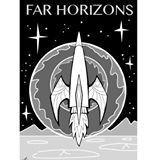 FAR HORIZONS is a FREE monthly eMagazine, brought about from a simple idea to let unpublished, thinly published and self-published writers and artists showcase their work to the World .The first issue (no. 1 April 2014) was released on the 17th of April, 2014. Far Horizons welcomes submissions for short works and art – check out the magazine on Joomag or Facebook for details.
FAR HORIZONS is a FREE monthly eMagazine, brought about from a simple idea to let unpublished, thinly published and self-published writers and artists showcase their work to the World .The first issue (no. 1 April 2014) was released on the 17th of April, 2014. Far Horizons welcomes submissions for short works and art – check out the magazine on Joomag or Facebook for details.
 Forbidden Planet is the world’s largest and best-known science fiction, fantasy and cult entertainment retailer and the largest UK stockist of the latest comics and graphic novels. We specialise in selling action figures, books, comics, DVDs, graphic novels and toys and we offer all the best merchandise from the cult cream of movies and television. We have exciting stores in many major UK cities, including our famous London Megastore on Shaftesbury Avenue and Megastores in Bristol and Southampton. To find a store near you, please use our Store Locator.Bristol Book Blog (BRSBKBLOG) is the blog of Bristol writer Pete Sutton and includes reviews, interviews and guest posts from writers and publishers and the occasional book giveaway.Bristol Horrorcon writing competition is open to all writers over the age of 163 stories will be chosen for publication in Far Horizons MagazineThe winners will be announced on 17/10/2015 at Bristol Horrorcon and on BRSBKBLOG website.Stories can be on any theme or subject and are welcome in any style but must be set in Bristol UK and must be in the Horror Genre.All entries must be received by Midnight on Saturday 5th September 2015There is no minimum word count for this competition.Please read the rules carefully before entering.Closing date for receipt of entries is 5th September at midnight BST.Entries must be made via email to BRSBKBLOG(at)Gmail.com with the subject line – “I think this will scare you: story title: your name”. Stories will be judged anonymously by the editorial team at Far Horizons so please don’t put your name in the file. Please send as .doc, .docx or .rtf in a readable font, 12 point, in English with UK spelling.There is no entry fee but each entrant may only enter one story.Entries will not be returned. Please keep a copy. No corrections or alterations can be made after receipt.Entries must be entirely the work of the entrant and must never have been previously published, in print or online (including websites, blogs, social network sites), or broadcast or won or been shortlisted in another writing competition. Any entry found to not follow this rule or to have been plagiarised will be disqualified.Entries will be judged anonymously with no details of who the author is on the entry itself. The accompanying email must clearly identify who’s work the entry is.All entrants must agree to have their work published in Far Horizons November Issue in e- format with Far Horizon owning first electronic publication rights. All other rights are retained by the author. All work submitted assumes that the Creator agrees to grant to the Publisher permission to include the Work in Far Horizons Magazine. This use of the Work pertains to non-exclusive rights, in the English language, to publish the Work, in Electronic and Print-On-Demand formats.The Creator retains copyright of the Work; the Publisher retains copyright of the Magazine. Copyright credit will be listed in all editions. The Creator warrants that he or she is the author and sole owner of the Work, that it is original and contains no matter unlawful in its content, that it does not violate the rights of any third party, and that the Work is not in the public domain.Creators will have approval of all edits and proofs before publication, and may provide a short biography to be included in the magazine.The parties involved (the Publisher and the Creator) acknowledge that each has read and understood this contract.Entries will be read by a judging panel consisting of the editorial team of Far Horizons. The judging panel will select the 3 prize winning stories. The judges’ decision is final and no individual correspondence will be entered into. Judges will not comment on individual stories nor give feedback on individual stories unless otherwise requested.Prizes will be awarded at the Bristol Horror Con on 17th October 2015 and will be posted to any of the finalists who are unable to attend on the evening or pick up prizes. Entrants will not be contacted individually about the competition results unless they are selected for publication. The list of prize-winners will be displayed on BRSBKBLOG website within 24 hours of the announcement at Bristol HorrorCon and winners will be notified by email.Entry implies an acceptance of all the competition rules. Entries that fail to comply with the entry rules and requirements may be disqualified.
Forbidden Planet is the world’s largest and best-known science fiction, fantasy and cult entertainment retailer and the largest UK stockist of the latest comics and graphic novels. We specialise in selling action figures, books, comics, DVDs, graphic novels and toys and we offer all the best merchandise from the cult cream of movies and television. We have exciting stores in many major UK cities, including our famous London Megastore on Shaftesbury Avenue and Megastores in Bristol and Southampton. To find a store near you, please use our Store Locator.Bristol Book Blog (BRSBKBLOG) is the blog of Bristol writer Pete Sutton and includes reviews, interviews and guest posts from writers and publishers and the occasional book giveaway.Bristol Horrorcon writing competition is open to all writers over the age of 163 stories will be chosen for publication in Far Horizons MagazineThe winners will be announced on 17/10/2015 at Bristol Horrorcon and on BRSBKBLOG website.Stories can be on any theme or subject and are welcome in any style but must be set in Bristol UK and must be in the Horror Genre.All entries must be received by Midnight on Saturday 5th September 2015There is no minimum word count for this competition.Please read the rules carefully before entering.Closing date for receipt of entries is 5th September at midnight BST.Entries must be made via email to BRSBKBLOG(at)Gmail.com with the subject line – “I think this will scare you: story title: your name”. Stories will be judged anonymously by the editorial team at Far Horizons so please don’t put your name in the file. Please send as .doc, .docx or .rtf in a readable font, 12 point, in English with UK spelling.There is no entry fee but each entrant may only enter one story.Entries will not be returned. Please keep a copy. No corrections or alterations can be made after receipt.Entries must be entirely the work of the entrant and must never have been previously published, in print or online (including websites, blogs, social network sites), or broadcast or won or been shortlisted in another writing competition. Any entry found to not follow this rule or to have been plagiarised will be disqualified.Entries will be judged anonymously with no details of who the author is on the entry itself. The accompanying email must clearly identify who’s work the entry is.All entrants must agree to have their work published in Far Horizons November Issue in e- format with Far Horizon owning first electronic publication rights. All other rights are retained by the author. All work submitted assumes that the Creator agrees to grant to the Publisher permission to include the Work in Far Horizons Magazine. This use of the Work pertains to non-exclusive rights, in the English language, to publish the Work, in Electronic and Print-On-Demand formats.The Creator retains copyright of the Work; the Publisher retains copyright of the Magazine. Copyright credit will be listed in all editions. The Creator warrants that he or she is the author and sole owner of the Work, that it is original and contains no matter unlawful in its content, that it does not violate the rights of any third party, and that the Work is not in the public domain.Creators will have approval of all edits and proofs before publication, and may provide a short biography to be included in the magazine.The parties involved (the Publisher and the Creator) acknowledge that each has read and understood this contract.Entries will be read by a judging panel consisting of the editorial team of Far Horizons. The judging panel will select the 3 prize winning stories. The judges’ decision is final and no individual correspondence will be entered into. Judges will not comment on individual stories nor give feedback on individual stories unless otherwise requested.Prizes will be awarded at the Bristol Horror Con on 17th October 2015 and will be posted to any of the finalists who are unable to attend on the evening or pick up prizes. Entrants will not be contacted individually about the competition results unless they are selected for publication. The list of prize-winners will be displayed on BRSBKBLOG website within 24 hours of the announcement at Bristol HorrorCon and winners will be notified by email.Entry implies an acceptance of all the competition rules. Entries that fail to comply with the entry rules and requirements may be disqualified.
https://farhorizonsmagazine.wordpress...
In association with Bristol Festival of Literature, Bristol Horrorcon, Bristol Book Blog and Far Horizons magazine are launching a Horror Writing Competition. Closing to entries on 5th September.Do you think you can scare us? Then get scribbling. We are looking for the best Horror short stories. We want shivers down our spines, we want to be disturbed, we want you to confront us with your, and our, worst nightmares.Your story must be set in Bristol UK, it must be 4,000 words or less and it must be Horror. Apart from that go wild.Stories should be sent to BRSBKBLOG (at) gmail.com with the subject line – “I think this will scare you: story title: your name”. Stories will be judged anonymously by the editorial team at Far Horizons so please don’t put your name in the file. Please send as .doc, .docx or .rtf in a readable font, 12 point, in English with UK spelling. Far Horizons is set up to help beginning writers improve and if your story doesn’t make it to the shortlist, and you’d like feedback as to why, and some constructive criticism then please contact us after the winners are announced.The top three stories will be published in Far Horizons November Issue and also win fabulous prizes kindly donated by PS Publishing (lots of book goodies from their catalogue) and Forbidden PlanetWinners will be announced at Horrorcon on the 17th October.
 Bristol Horror Con will take place on Saturday 17th October 2015 at the Future Inn, Bristol. The expo will celebrate horror in literature, film, music, games and art. The day celebrates horror across all mediums and will feature guests, traders, games, cosplay competition, a film screening, sfx demo and more!Follow the Facebook page and Facebook Event for updates on tickets and guests.
Bristol Horror Con will take place on Saturday 17th October 2015 at the Future Inn, Bristol. The expo will celebrate horror in literature, film, music, games and art. The day celebrates horror across all mediums and will feature guests, traders, games, cosplay competition, a film screening, sfx demo and more!Follow the Facebook page and Facebook Event for updates on tickets and guests.
 Bristol Festival of Literature is a programme of events and performances celebrating fiction (novels, short stories and flash fiction) with some poetry and Bristol-based non-fiction. We do this in three ways: We inspire audiences by inviting the very best UK and International authors to perform here; we engage communities with each other through creative-word events for interest groups and neighbourhoods; and we equip writers at all levels from beginner to professional with masterclasses, showcase events and routes to publishing. It’s about igniting audiences with the passion and power of entertaining, soul-searching and original writing, at a time when it is needed most. We love irrepressible creativity and dissenting voices. That’s why we call it ‘Unputdownable’.
Bristol Festival of Literature is a programme of events and performances celebrating fiction (novels, short stories and flash fiction) with some poetry and Bristol-based non-fiction. We do this in three ways: We inspire audiences by inviting the very best UK and International authors to perform here; we engage communities with each other through creative-word events for interest groups and neighbourhoods; and we equip writers at all levels from beginner to professional with masterclasses, showcase events and routes to publishing. It’s about igniting audiences with the passion and power of entertaining, soul-searching and original writing, at a time when it is needed most. We love irrepressible creativity and dissenting voices. That’s why we call it ‘Unputdownable’.
 PS Publishing was conceived and created by award-winning writer Pete Crowther in 1998, since which time the imprint has put out some 600 titles, working with the very best writers of fantasy, horror and SF, both fiction and non-fiction. Picking up more than twenty awards along the way, the company has added a poetry imprint (Stanza Press), a pot pourri of newer talents (Showcase), an imprint dedicated to the classic fiction of days gone by (PulpS), a line of trade and mass market paperbacks (Drugstore Indian Press) and the critically acclaimed Artbooks line celebrating and reprinting the much loved horror and SF comicbooks of the 1940s and 50s. Considered for some time to be the biggest small press in the country (picking up the British Fantasy Society’s Best Small Press Award for seven straight years until Pete removed the company from further consideration) PS is now the UK’s most successful genre publisher and a world leader in the field.
PS Publishing was conceived and created by award-winning writer Pete Crowther in 1998, since which time the imprint has put out some 600 titles, working with the very best writers of fantasy, horror and SF, both fiction and non-fiction. Picking up more than twenty awards along the way, the company has added a poetry imprint (Stanza Press), a pot pourri of newer talents (Showcase), an imprint dedicated to the classic fiction of days gone by (PulpS), a line of trade and mass market paperbacks (Drugstore Indian Press) and the critically acclaimed Artbooks line celebrating and reprinting the much loved horror and SF comicbooks of the 1940s and 50s. Considered for some time to be the biggest small press in the country (picking up the British Fantasy Society’s Best Small Press Award for seven straight years until Pete removed the company from further consideration) PS is now the UK’s most successful genre publisher and a world leader in the field. FAR HORIZONS is a FREE monthly eMagazine, brought about from a simple idea to let unpublished, thinly published and self-published writers and artists showcase their work to the World .The first issue (no. 1 April 2014) was released on the 17th of April, 2014. Far Horizons welcomes submissions for short works and art – check out the magazine on Joomag or Facebook for details.
FAR HORIZONS is a FREE monthly eMagazine, brought about from a simple idea to let unpublished, thinly published and self-published writers and artists showcase their work to the World .The first issue (no. 1 April 2014) was released on the 17th of April, 2014. Far Horizons welcomes submissions for short works and art – check out the magazine on Joomag or Facebook for details.
 Forbidden Planet is the world’s largest and best-known science fiction, fantasy and cult entertainment retailer and the largest UK stockist of the latest comics and graphic novels. We specialise in selling action figures, books, comics, DVDs, graphic novels and toys and we offer all the best merchandise from the cult cream of movies and television. We have exciting stores in many major UK cities, including our famous London Megastore on Shaftesbury Avenue and Megastores in Bristol and Southampton. To find a store near you, please use our Store Locator.Bristol Book Blog (BRSBKBLOG) is the blog of Bristol writer Pete Sutton and includes reviews, interviews and guest posts from writers and publishers and the occasional book giveaway.Bristol Horrorcon writing competition is open to all writers over the age of 163 stories will be chosen for publication in Far Horizons MagazineThe winners will be announced on 17/10/2015 at Bristol Horrorcon and on BRSBKBLOG website.Stories can be on any theme or subject and are welcome in any style but must be set in Bristol UK and must be in the Horror Genre.All entries must be received by Midnight on Saturday 5th September 2015There is no minimum word count for this competition.Please read the rules carefully before entering.Closing date for receipt of entries is 5th September at midnight BST.Entries must be made via email to BRSBKBLOG(at)Gmail.com with the subject line – “I think this will scare you: story title: your name”. Stories will be judged anonymously by the editorial team at Far Horizons so please don’t put your name in the file. Please send as .doc, .docx or .rtf in a readable font, 12 point, in English with UK spelling.There is no entry fee but each entrant may only enter one story.Entries will not be returned. Please keep a copy. No corrections or alterations can be made after receipt.Entries must be entirely the work of the entrant and must never have been previously published, in print or online (including websites, blogs, social network sites), or broadcast or won or been shortlisted in another writing competition. Any entry found to not follow this rule or to have been plagiarised will be disqualified.Entries will be judged anonymously with no details of who the author is on the entry itself. The accompanying email must clearly identify who’s work the entry is.All entrants must agree to have their work published in Far Horizons November Issue in e- format with Far Horizon owning first electronic publication rights. All other rights are retained by the author. All work submitted assumes that the Creator agrees to grant to the Publisher permission to include the Work in Far Horizons Magazine. This use of the Work pertains to non-exclusive rights, in the English language, to publish the Work, in Electronic and Print-On-Demand formats.The Creator retains copyright of the Work; the Publisher retains copyright of the Magazine. Copyright credit will be listed in all editions. The Creator warrants that he or she is the author and sole owner of the Work, that it is original and contains no matter unlawful in its content, that it does not violate the rights of any third party, and that the Work is not in the public domain.Creators will have approval of all edits and proofs before publication, and may provide a short biography to be included in the magazine.The parties involved (the Publisher and the Creator) acknowledge that each has read and understood this contract.Entries will be read by a judging panel consisting of the editorial team of Far Horizons. The judging panel will select the 3 prize winning stories. The judges’ decision is final and no individual correspondence will be entered into. Judges will not comment on individual stories nor give feedback on individual stories unless otherwise requested.Prizes will be awarded at the Bristol Horror Con on 17th October 2015 and will be posted to any of the finalists who are unable to attend on the evening or pick up prizes. Entrants will not be contacted individually about the competition results unless they are selected for publication. The list of prize-winners will be displayed on BRSBKBLOG website within 24 hours of the announcement at Bristol HorrorCon and winners will be notified by email.Entry implies an acceptance of all the competition rules. Entries that fail to comply with the entry rules and requirements may be disqualified.
Forbidden Planet is the world’s largest and best-known science fiction, fantasy and cult entertainment retailer and the largest UK stockist of the latest comics and graphic novels. We specialise in selling action figures, books, comics, DVDs, graphic novels and toys and we offer all the best merchandise from the cult cream of movies and television. We have exciting stores in many major UK cities, including our famous London Megastore on Shaftesbury Avenue and Megastores in Bristol and Southampton. To find a store near you, please use our Store Locator.Bristol Book Blog (BRSBKBLOG) is the blog of Bristol writer Pete Sutton and includes reviews, interviews and guest posts from writers and publishers and the occasional book giveaway.Bristol Horrorcon writing competition is open to all writers over the age of 163 stories will be chosen for publication in Far Horizons MagazineThe winners will be announced on 17/10/2015 at Bristol Horrorcon and on BRSBKBLOG website.Stories can be on any theme or subject and are welcome in any style but must be set in Bristol UK and must be in the Horror Genre.All entries must be received by Midnight on Saturday 5th September 2015There is no minimum word count for this competition.Please read the rules carefully before entering.Closing date for receipt of entries is 5th September at midnight BST.Entries must be made via email to BRSBKBLOG(at)Gmail.com with the subject line – “I think this will scare you: story title: your name”. Stories will be judged anonymously by the editorial team at Far Horizons so please don’t put your name in the file. Please send as .doc, .docx or .rtf in a readable font, 12 point, in English with UK spelling.There is no entry fee but each entrant may only enter one story.Entries will not be returned. Please keep a copy. No corrections or alterations can be made after receipt.Entries must be entirely the work of the entrant and must never have been previously published, in print or online (including websites, blogs, social network sites), or broadcast or won or been shortlisted in another writing competition. Any entry found to not follow this rule or to have been plagiarised will be disqualified.Entries will be judged anonymously with no details of who the author is on the entry itself. The accompanying email must clearly identify who’s work the entry is.All entrants must agree to have their work published in Far Horizons November Issue in e- format with Far Horizon owning first electronic publication rights. All other rights are retained by the author. All work submitted assumes that the Creator agrees to grant to the Publisher permission to include the Work in Far Horizons Magazine. This use of the Work pertains to non-exclusive rights, in the English language, to publish the Work, in Electronic and Print-On-Demand formats.The Creator retains copyright of the Work; the Publisher retains copyright of the Magazine. Copyright credit will be listed in all editions. The Creator warrants that he or she is the author and sole owner of the Work, that it is original and contains no matter unlawful in its content, that it does not violate the rights of any third party, and that the Work is not in the public domain.Creators will have approval of all edits and proofs before publication, and may provide a short biography to be included in the magazine.The parties involved (the Publisher and the Creator) acknowledge that each has read and understood this contract.Entries will be read by a judging panel consisting of the editorial team of Far Horizons. The judging panel will select the 3 prize winning stories. The judges’ decision is final and no individual correspondence will be entered into. Judges will not comment on individual stories nor give feedback on individual stories unless otherwise requested.Prizes will be awarded at the Bristol Horror Con on 17th October 2015 and will be posted to any of the finalists who are unable to attend on the evening or pick up prizes. Entrants will not be contacted individually about the competition results unless they are selected for publication. The list of prize-winners will be displayed on BRSBKBLOG website within 24 hours of the announcement at Bristol HorrorCon and winners will be notified by email.Entry implies an acceptance of all the competition rules. Entries that fail to comply with the entry rules and requirements may be disqualified.
Published on August 18, 2015 06:19
August 13, 2015
The book is always better than the film- Or is it? Adaptions
One of my favourite films is Jaws, which I've seen a gazillion times -
I can't say that the book (which I've only just got round to reading this year) is one of my favourite books.
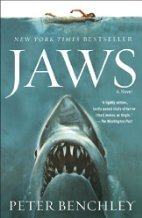
It's axiomatic that the book is always better than the film, isn't it?
Well not in this case...
Novels are about inner worlds and inner journeys and can cope with having a multitude of sub-plots. Films tend to not focus on the inner world, for obvious reasons. And, in action movies, sub-plots muddy the narrative.
Spielberg's film substantially changes the relationships between the characters as depicted by Benchley. The film is tighter, has more humour, has more sympathetic characters and has more shark than the book.
It very much is a case where the film is far better than the book.
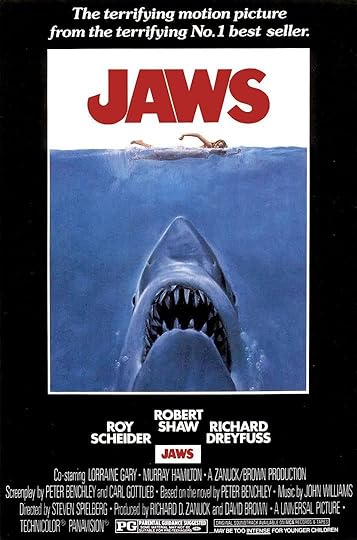
I'm not alone in this - go read the 1 and 2 star reviews on Amazon.
So adaption - is it always a bad idea? A book is a very different medium to a film after all (just think about it in terms of POV and inner worlds) so why is it that Hollywood relentlessly adapts books, and now comics. Although comics is a medium of moments and, having a visual quality is, at first glance, more adaptable.
There are good adaptations - Jaws, bad adaptations - The Hobbit (imho - I've not even seen the series out it was so dire) and faithful adaptations - To Kill a Mockingbird
There are even film to book adaptations, which sometimes suffer the same problem of the film being great and the adaptation being awful - by all accounts the book of ET is just awful (although I dislike the film and have not read the book)
What are your worst and best adaptions book to film or film to book?
I can't say that the book (which I've only just got round to reading this year) is one of my favourite books.

It's axiomatic that the book is always better than the film, isn't it?
Well not in this case...
Novels are about inner worlds and inner journeys and can cope with having a multitude of sub-plots. Films tend to not focus on the inner world, for obvious reasons. And, in action movies, sub-plots muddy the narrative.
Spielberg's film substantially changes the relationships between the characters as depicted by Benchley. The film is tighter, has more humour, has more sympathetic characters and has more shark than the book.
It very much is a case where the film is far better than the book.

I'm not alone in this - go read the 1 and 2 star reviews on Amazon.
So adaption - is it always a bad idea? A book is a very different medium to a film after all (just think about it in terms of POV and inner worlds) so why is it that Hollywood relentlessly adapts books, and now comics. Although comics is a medium of moments and, having a visual quality is, at first glance, more adaptable.
There are good adaptations - Jaws, bad adaptations - The Hobbit (imho - I've not even seen the series out it was so dire) and faithful adaptations - To Kill a Mockingbird
There are even film to book adaptations, which sometimes suffer the same problem of the film being great and the adaptation being awful - by all accounts the book of ET is just awful (although I dislike the film and have not read the book)
What are your worst and best adaptions book to film or film to book?
Published on August 13, 2015 07:15
August 6, 2015
Guest post - Torill Kornfeldt

https://twitter.com/vet_torill
Torill is a science journalist and dropped in to talk about biology that should inspire sci-fi...
In 1910 a British expedition embarked on a three-year trip to Antarctica. Among the scientists was a young biologist named George Murray Levick who was studying the behaviour of the adorable black and white Adélie penguins, named after the wife of another explorer.
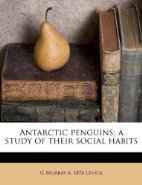
George was in for a nasty shock, as the penguins turned out to be anything but cute in real life. He witnessed males having sex with other males and dead females, including several that had died the previous year. He saw them sexually coerce females and chicks and occasionally kill them. He even saw them trying to have sex with rocks that somewhat resembled penguins.
Shaken by this abhorrent and clearly unnatural behaviour he pondered what to do with this information. In the name of science he had to share it with other scientists, but how to do so without risking the descriptions ending up in the hands of someone without proper education, who would surely misunderstand it? In the end he wrote down his findings in Greek, a language that only those with a higher education in Britain spoke, and circulated only a few copies to selected researches. The knowledge about the darker side of penguins was clearly too much for society to stomach. The copies were lost, but one of them was found again in 2012.
It’s easy to make fun of prude Edwardians, but our view of nature and what nature should be has changed little since then. We tend to think of nature and animals as a constant mirror for humanity, either by showing “this is what we truly are, civilisation has just warped us along the way” or “this is the opposite of us, this chaos and darkness within us must be avoided at all costs”. Either way, we only see the things that already exist within ourselves.
The problem with this view is that we end up living in an impoverished reality, unable to see and process all of the fantastical, strange, unexpected and marvelling things that is constantly happening around us. But this is also why biology is such an excellent source of inspiration for science fiction and fantasy.
By tradition, science fiction has been the realm of technology and astronomy and fantasy has been inspired by history and mythology. None of the fantastical writing has really tapped into the rich, dark and turbulent waters of biology for stimulus. (There are, of course, several exceptions. Blindsight by Peter Watts is an excellent read, as is Oryx & Crake by Margaret Atwood.)
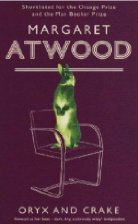
This is a shame. There are worlds upon worlds waiting to be discovered in every backyard pond, and stranger things going on in the litter of the forest-floor than the most twisted of minds could create. Let me tell you about a fluke-worm. It is a parasite, with only a few nerve-clusters for a brain, and is starts it’s life as an egg inside the stomach of a sheep. The egg leaves the sheep via excrement and is subsequently eaten by a snail. There it starts to irritate the snail’s mucus-glands until it gets flushed out in a stream of froth. The point of this is not only to leave the snail, but mainly to get promptly picked up and eaten by an ant. The ant, it seems, cannot resist this mousse of slime.
Now, this is where the interesting things start to happen. The fluke-worm moves up into the brain of the ant and hijacks it’s circuits, turning it into something like a zombie-werewolf.
In daytime the ant acts normally, collecting food and interacting with the other ants in the nest. But when evening comes and the temperature drops, something shifts within the animal. It leaves its sisters in the nest and starts climbing a blade of grass and eventually clings on to the top, dangling there all night. In the morning, when the temperature rises again, the ant releases its grip on the grass, climbs down and joins the other ants in their normal ant-life.
This is repeated every night until the ant eventually gets eaten by a sheep, grazing at dusk or dawn, and the now mature worm finds a new host. There are many more mind-altering parasites around; from fungi in the rainforest to toxoplasma that may even have an effect on us humans.
https://youtu.be/lGSUU3E9ZoM
Another area where biology could be an inspiration for more interesting literature is sex and sexes, which are not nearly as permanent or simple as people tend to believe. Take the hawkfish, a small but beautifully coloured fish that lives in coral reefs outside Japan. Like several fishes they live in harems, a large male defends a territory and gets the bonus of fertilising the eggs of the smaller females in the same area. Occasionally, an even larger male will come along and try to take over the harem, whereupon the former leader quickly changes his sex and joins the other females, happily laying fertile eggs. Should the male disappear, the largest female of the group will change her sex and take his place, the same will happen if the harem grows too big and splits.
[image error]
This gender swapping is not uncommon, although the triggers change. Every northern prawn you have ever eaten has either done it or was about to. Their sex depends on their size, male when they are small and female when they are large enough to take the cost of producing eggs. The genders of crocodiles and a lot of other reptiles depend on the temperature in the egg while they are developing. And then, of course, there are all the different variants of hermaphrodites, attached and parasitic males, virgin births and varying number of sexes.
I’m not even going to start on all the strange and complicated sexual behaviours going on; from functional necrophilia to free-swimming penises and acrobatic cannibalism. (But check the notes if you are interested J)
The point of this is not to make you fear the zombie-ants on your lawn, but to show that the world is a lot stranger than we usually give it credit for. We are all a bit like George Murray Levick, doing our best to fit reality to our own perception, making our lives poorer in the process. Think about that the next time you eat a shrimp.
Notes: - info about the Antarctic expedition: http://www.theguardian.com/world/2012/jun/09/sex-depravity-penguins-scott-antarctic - the fluke: https://en.wikipedia.org/wiki/Dicrocoelium_dendriticum- The hawkfish: https://www.newscientist.com/article/dn21332-zoologger-transgender-fish-perform-reverse-sex-flip/- acrobatic cannibalism: https://en.wikipedia.org/wiki/Redback_spider- free-swimming penises: https://en.wikipedia.org/wiki/Hectocotylus
Functional necrophilia: http://phenomena.nationalgeographic.com/2013/02/26/male-frog-extracts-and-fertilises-eggs-from-dead-female/
Published on August 06, 2015 00:44
August 3, 2015
Bristol Festival of Literature - in need of Funds
Bristol Festival of Literature - http://unputdownable.org/ is a week long festival in October. it's entirely volunteer driven and looking for funding to cover costs like - venue hire, paying for refreshments etc.
It's running a crowdfunding campaign over
here: https://www.fundsurfer.com/project/br... and every little bit really does help.

The organisers would be very grateful if you could pop onto the site and pledge some money - there are some great rewards.
Help us put on a great festival again this year!
It's running a crowdfunding campaign over
here: https://www.fundsurfer.com/project/br... and every little bit really does help.

The organisers would be very grateful if you could pop onto the site and pledge some money - there are some great rewards.
Help us put on a great festival again this year!
Published on August 03, 2015 12:56
Pete Sutton's Blog
- Pete Sutton's profile
- 14 followers
Pete Sutton isn't a Goodreads Author
(yet),
but they
do have a blog,
so here are some recent posts imported from
their feed.




